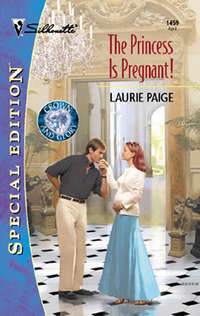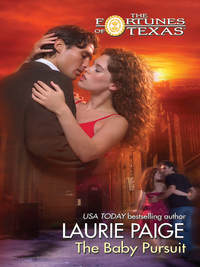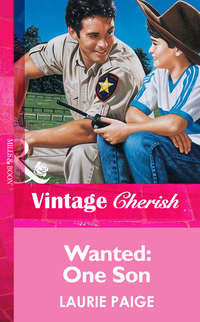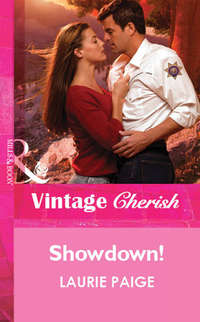
Полная версия
Something To Talk About

“I think it would be better if you found another place to stay,” Kate said.
Jess digested the news. “Why?”
“Because we’re dangerous to each other’s peace of mind. Because you’re going to be here another three weeks and I’m not sure I can hold out that long.”
“No,” he said.
She glared at him in frustration.
“I’m not going to run, Kate. You’re afraid of what’s between us. So am I. But we’re adults. We can handle it.”
“But what if, some night, we’re weak at the same time?”
Following an impulse stronger than common sense, he sat beside her then laid his hand along her jaw and turned her face to his. “Is this what you mean?”
Claiming her surprised mouth, he held the kiss to gentleness when everything in him clamored for urgency and hot, wild sharing.
“See?” Jess said, his breath coming more rapidly. “No problem.”

Dear Reader,
May marks the celebration of “Get Caught Reading,” a national campaign the Association of American Publishers created to promote the sheer joy of reading. “Get Caught Reading” may be a phrase that’s familiar to you, but if not, we hope you’ll familiarize yourself with it by picking up the wonderful selections that Silhouette Special Edition has to offer….
Former NASA engineer Laurie Paige says that when she was young, she checked out The Little Engine That Could from the library fifty times. “I read it every week,” Laurie recalls. “I was so astounded that the library would lend books to me for free. I’ve been an avid reader ever since.” Though Laurie Paige hasn’t checked out her favorite childhood storybook for a while, she now participates in several local literacy fund-raisers and reads to young children in her community. Laurie is also a prolific writer, with nearly forty published Silhouette titles, including this month’s Something To Talk About.
Don’t miss the fun when a once-burned rancher discovers that the vivacious amnesiac he’s helping turns out to be the missing Stockwell heiress in Jackie Merritt’s The Cattleman and the Virgin Heiress. And be sure to catch all of THE CALAMITY JANES, five friends sharing the struggles and celebrations of life, starting with Do You Take This Rebel? by Sherryl Woods. And what happens when Willa and Zach learn they both inherited the same ranch? Find out in The Ties That Bind by Ginna Gray. Be sure to see who will finish first in Patricia Hagan’s Race to the Altar. And Judith Lyons pens a highly emotional tale with Lt. Kent: Lone Wolf.
So this May, make time for books. Remember how fun it is to browse a bookstore, hold a book in your hands and discover new worlds on the printed page.
Best,
Karen Taylor Richman
Senior Editor
Something To Talk About
Laurie Paige

www.millsandboon.co.uk
In loving memory, to “Big Sis.”
You were always there for us.
LAURIE PAIGE
says, “One of the nicest things about writing romances is researching locales, careers and ideas. In the interest of authenticity, most writers will try anything…once.” Along with her writing adventures, Laurie has been a NASA engineer, a past president of the Romance Writers of America (twice!), a mother and a grandmother (twice, also!). She was twice a Romance Writers of America RITA Award finalist for Best Traditional Romance, and has won awards from Romantic Times Magazine for Best Silhouette Special Edition and Best Silhouette. Recently resettled in northern California, Laurie is looking forward to whatever experiences her next novel will send her on.
Dear Reader,
Sometimes a book is born from a sentence or phrase I hear, or the lyrics of a song. Once it was an incident I read in a magazine while sitting in the dentist’s office. The Windraven Legacy was born while hiking in the Wind River region of Wyoming. After a hard climb on a trail that led up over a ridge, I stopped at the top and simply stared. Before me was a magnificent vista—deep blue sky, a mountain carved into a cirque by a glacier that had passed that way thousands of years ago, gleaming snow lying in the hollow scoured into the granite and a lake formed by the melting snow, all within a perfect postcard of a valley blooming with wildflowers and lined with pine and fir trees.
In this valley, now owned by the National Forest Service, I found an abandoned house, once part of a prosperous ranch. I sat on the porch steps and ate lunch while the wind whispered through the trees. I could almost hear the voices from the past, murmuring of love and happiness, of loss and despair. In a cottonwood along a nearby creek, a raven cawed. Another answered. Their calls were indescribably lonely. The story of the Windoms and Herriots took shape in my mind….

Contents
Chapter One
Chapter Two
Chapter Three
Chapter Four
Chapter Five
Chapter Six
Chapter Seven
Chapter Eight
Chapter Nine
Chapter Ten
Chapter Eleven
Chapter Twelve
Chapter Thirteen
Chapter One
Jess Fargo parked his pickup under the cool green shadow of a live oak arching over the gravel driveway and shut off the engine. The sheer bliss of not watching the road or squinting into the hot June sun lasted about two seconds.
Then the pain in his leg kicked in.
He cursed silently and long, but words didn’t ease the shower of hot needles aimed at a spot directly under his left kneecap. He willed the pain into submission.
“You want to stay here or go in?” he asked Jeremy.
“Stay here,” Jeremy answered in the shorthand of youth.
His son. Ten years old. Rangy as a winter deer. Silent. Resentful. A sackcloth-and-ashes martyr to parental whims.
His ex hadn’t wanted to let him see his son at all when they’d divorced five years ago. Then, two weeks ago, she shows up at the apartment, announces she’s getting married again and she can’t handle his son, so he’ll have to take the boy.
Bingo! He’s a full-time father again…with a shattered knee and uncertain prospects about his future.
Washed up. Has-been. He squashed the descriptive words as they seared across his brain.
Since he’d put in his twenty years and had been injured in the line of duty, he would have a pension from the Houston PD, so all was not lost.
Wasn’t life just too damn wonderful? Jess thought as he climbed down from the truck.
Standing on the springy grass, the dappled, afternoon light shifting in soft patterns across the green, he studied the house and gardens.
His years as a cop had taught him to ask another cop when he needed information. The house was precisely as described by the police detective in Wind River, Wyoming, where he’d stopped to inquire about a place to stay. Its location couldn’t be better for his purposes.
The yellow Victorian had black shutters and white trim. Its posts and spindles were graceful but sturdy. A porch, with a white wooden swing hanging from its rafters, wrapped across the front and disappeared around the side of the building.
The house, the valley, the snow-tipped mountain peaks poking at the sky—the whole area looked like the set for one of those ideal-family TV shows where the major sin was using someone else’s hairbrush without asking. On “mean street,” as cops called the ones where violence reigned, that could get a person diced into salad-size bits real quick.
A bitterness that had nothing to do with the postcard prettiness of the scene and everything to do with home and family and his own expectations of life rose in him.
He turned, wanting only to get out of there, then sucked air between his teeth as agony lashed at his leg. God, he hated being weak. He clutched the door handle of the pickup until the pain receded. When he could think clearly again, he acknowledged he needed a resting place. That’s why he was here.
The garage was nestled in the shade of two walnut trees, the door open, disclosing a beige four-door compact station wagon. It was the type of car a woman living alone would drive—dependable, not too big, but capable of carrying a rosebush home from a nursery or hauling boxes of clothing to the church bazaar, exactly the vehicle he’d have picked for Kate Mulholland, a “wonderful, but reclusive widow,” according to the detective.
The widow also had an apartment over the garage. Two bedrooms. Private. Away from noise and traffic and people. Perfect. His other reasons for choosing this locale, besides rest and recuperation, made it ideal.
But first things first. He’d better find the widow and see about the apartment. Just as he reached into the truck for his cane, a scream rent the air. He instinctively crouched.
Dropping the cane and grabbing his gun instead, he muttered, “Stay down,” to his son and headed around the side of the house at a fast hobble. And came to a dead stop.
The woman shrieked again as the garden hose, loose and writhing around on the grass like some kind of demented green snake, slung a stream of water over her face and chest. The stream hit the back steps of the house, slid across the kitchen windows, slapped him in the face and slithered back the other way, covering the same objects on the return trip.
Cursing, Jess looked around for the tap. However, the widow beat him to it. While he’d been getting his drenching, she’d run to the faucet. With several deft turns she had the monster subdued in a limp coil on the ground between them.
In the silence he saw a hundred things at once. The way her dark hair gleamed with fiery sparks in the late-afternoon sun. The transparency of her wet T-shirt and the bra that was clearly visible beneath it. The dark nipples of her breasts, beaded from the cold water. The drip of water down her faded slacks, which clung damply to her hips and long legs. The way her bare toes, with bright red nails crinkled as she pressed them into the serpentine green of the grass, as if she were embarrassed at being bested by the marauding hose.
Also, the dart of fear across her face as she faced him.
Her eyes, big and blue and truly beautiful, gleamed in the sunlight. Other emotions mixed with the fear and flitted briefly through their depths.
Slowly she raised her hands. “Don’t shoot,” she said, a hint of careful humor mixed with the wariness. “We’ll go peacefully.” With her foot she jabbed the hose as if it were her companion in crime. Her voice was pure honey.
The words hit home. He glanced at the gun with a scowl, then shoved it into the back waistband of his jeans. He couldn’t take his eyes off her. There was something real and urgent and compelling about her…and something elusive and mystical. He couldn’t explain it.
“Sorry. I thought you were being attacked,” he said, his tone harsh as he tried to close the breach in his emotional defenses with the anger that usually drowned out all else.
She gestured in apology. “You got wet—”
“It’s okay, Kate. Don’t fuss.”
She visibly drew back, her gaze suspicious. “How do you know my name? I don’t know you.” She picked up the garden rake.
“Detective Bannock sent me. She told me your name, what you looked like.” He spoke curtly, like a cop on a case. He tried to keep his eyes above her neckline. He cursed again. That didn’t erase the picture of her from his inner vision, though, or cool the blood that pounded hotly through him.
The last thing he needed was a fractious libido to go with his other problems. He glanced down at his soaked shirt.
Washed up. Has-been.
“Shannon sent you?” the widow asked.
“Yeah, she said you had an apartment I could rent. I’m Jess Fargo, Houston Police Department. I’ll show you my ID.” He reached slowly into his hip pocket for his wallet.
The water and the breeze produced a cooling effect. He could see goose bumps on her arms and neck. Her nipples were still tight. A shudder ran through him, reminding him of all the things he had once liked about a warm and willing woman. Well, he still liked some things…except the closeness sex demanded and the emotional baggage women wanted as a result.
He flipped open his wallet and held the badge toward her. When she didn’t move, he took a step. His left knee buckled.
Flinging out a hand for balance as he teetered awkwardly, he encountered the rake, then warm flesh. An arm wrapped around his waist. She dropped the rake and took part of his weight until he got his legs under him again.
“Are you okay?” she asked. “Did you hurt your leg?”
“Got it shot up during an arrest last month. It isn’t real stable just yet.” He gritted the words as pain raced up his thigh and lodged in his spine.
“Oh, that’s too bad.” Her sympathy was real and immediate.
He directed an irritated glance her way, then lingered, fascinated by the fine hairs at her temples, each glowing like a dark ember as the wind tumbled them in the sunlight.
“You smell good,” he said, the words springing from a need inside him that he hadn’t known existed.
“Lemon basil, I suspect. I’ve been weeding it.” She glanced over her shoulder. “Can you get up the steps? Or I’ll bring you a chair—”
“I’ll manage. Just let me hold on to you.”
“Of course.”
She was compassionate but brisk, and he was pretty sure she didn’t know about the wet T-shirt. Or what it was doing to him. If so, she had more guile than any woman he’d ever met.
“Lean on me as much as you need,” she invited while she eyed the distance to the house and obviously appraised their chances of getting there. “I’m pretty strong.”
She was. Beneath the curves, he could feel the ripple of toned muscles as she tried to take more of his weight. He held on with an arm about her shoulders, aware of one firm breast snug against his cracked rib, which had gotten its share of punishment in the shoot-out and ensuing tussle.
Her hold hurt yet felt so unbearably good he would have begged her to continue even knowing his rib was going to puncture his heart if she did.
He was startled at the admission. He hadn’t realized he needed contact with another human this badly—
“Are you sure you’re okay?”
He stared into eyes so pure a blue they defined the color. “Your eyes,” he murmured, trying to find words for them.
She lowered the naturally dark lashes with their enticing curl at the ends, shielding her eyes from his gaze. “You’ll get used to them,” she said in an offhand manner. “Are you ready?”
“Yes.”
A groan forced its way between his clenched lips as he put weight on his throbbing knee. The run, then the sudden stop and his full weight coming down on the rebuilt bone and the synthetic replacement kneecap had probably undone a month’s worth of healing. He cursed silently, the sensual hunger at last beaten into submission by the pain of movement.
A cynical wisdom murmured that her guilt over his pain might be the best way into the apartment over the garage. He stumbled a bit as they struggled up the short set of stairs and wasn’t sure if it was deliberate or due to the weakness in his leg. She tightened her grip and cast him a worried glance as they eased into the house.
“There,” the widow said, lowering her arms to let him settle on a comfortable maple kitchen chair.
He didn’t let his arm trail across her back or hips as they disengaged, but he had a sudden, surprising sensation about how it might feel. Clenching his teeth, he tried to overcome the thoughts that stabbed at him as relentlessly as the hot needles in his leg.
“Would you like a glass of tea?” she asked.
“You have anything stronger?”
“Bourbon.”
“A double.” He wiped water and the sweat of painful effort off his face with a hand that shook. “Nothing like being as weak as a baby in front of a woman.”
He tried to smile in order to wipe the concern out of her eyes. Pity was the one thing he didn’t need and wouldn’t accept from anyone.
“That’s okay. Shall I fix an ice bag for your knee?”
“No, it’ll be okay.” He laid his gun on a pink-and-green-striped place mat on the table and leaned back with a bone-weary sigh against a cushion tied to the chair.
A chintz-and-china type, he decided, glancing around the spotless kitchen with its bright floral touches. Down-to-earth, too. She had the soft Western drawl he’d noticed in the female police detective. It was pleasant—
“Dad?”
Jess jerked around with a frown. Jeremy stood with his nose an inch from the screen door, gazing in at them.
“I thought I told you to stay in the truck,” he said, the sharp edge of his anger and pain boiling over.
The widow gave him a puzzled frown, then turned a dazzling smile toward the door. “Hi, come on in. It’s open.”
Jeremy stood on the step, his bony kid’s face set in a mulish scowl, and stared at him through the screen. Jess tamped down his temper. “You heard the lady. Come in.”
The boy slid inside and stood a foot from the door like a wild creature staying near his escape hole.
Jess felt the regret rise all at once, bitter with his own resentment in acknowledgment of lost opportunities with this person who was a carbon copy of his younger, once idealistic self. Pain hit him again, this time in his heart. No one had ever told him regret was so hard to live with.
His gaze collided with the woman’s. Her incredible eyes filled with pity. The cold shield of past humiliations snapped shut around him. He might be a has-been cop, but at least he wasn’t a falling-down drunk the way his own father had been. Saturday-night brawls had been the order of life in his youth. His son had never had to face that. The boy had had it easy compared to the neighborhood where he’d grown up.
He shook off the memories of the past and concentrated on the pain of the present. He struggled to pull the jeans leg up, but it was hopeless. The material was too tight, his knee too swollen.
“I’ll help, Dad. You’d better get some ice on that. Remember what the doctor said.”
Jess was surprised at his son’s concern, then doubly so when Jeremy dropped to his haunches in front of him and tried to help. “It’s okay, son. I’ll take care of it later.”
He glanced up to find his hostess observing him with a slight frown line between her eyes. A sense of her uneasiness came to him. “You’ll need an ice pack,” she said, and set to work with an unnecessary show of industry.
He hesitated, then retrieved a knife from his pocket and proceeded to split the jeans along the seam. The scar tissue, when exposed, was an angry red welt along the top and side of his knee. The flesh puffed out like an adder about to strike. So much for taking it easy for three months.
“Damn,” he said softly.
She turned to face him and dropped the container of ice she’d removed from the freezer. Ice cubes hit and skittered across the shining green-and-white kitchen floor.
“Oh, shoot,” she said in aggrieved tones, not looking his way. She scooped some cubes into a plastic bag, added some water and zipped it closed. Her face was pale.
“Sorry, I didn’t mean to startle you.”
He was puzzled at the tremor in her hand when she handed the bag to him. He saw her glance at his knee, then away. It was the scars that bothered her. Funny, but he wouldn’t have taken her for the squeamish sort.
While he placed the ice pack on his leg, she swept the icy debris out the back door. None of the wary humor he’d noticed earlier was visible. What was it with a woman who could face down a stranger with a gun but was profoundly disturbed at the sight of a few scars?
A woman who had been terribly frightened by something in her past, the cop in him answered. He hated it when women and children were hurt, often by the very men who were supposed to look after and protect them. Which was why he’d become a cop, he supposed.
“I won’t hurt you,” he said in the same soothing tone he used with victims of domestic violence, the same tone she’d used with him while facing his weapon.
“Of course not. I never thought you would.” She replaced the broom in the closet. Her eyes met his for a second.
The sparkle was back, and he breathed deeply as the tension in his stomach uncoiled. “The ice is helping. The swelling seems to have stopped, and the pain is easing up.”
“Good.” She poured a double shot of bourbon and set the glass on the place mat near the gun. “Would you excuse me? I need to change clothes.”
“Sure. We’ll be here.” He wasn’t going anywhere fast on that knee.
She smiled and nodded, then hurried out. He heard her footsteps on the stairs a second later.
Kate locked her bedroom door and dashed to the bedside phone. She called the number that went straight to Shannon’s line at the police department.
“Bannock, here.”
“Shannon—”
“Hi, Kate. No, I have not forgotten your birthday luncheon tomorrow. I even got you a card.”
“I’m expecting homemade cookies, too. Lots of ’em.”
“Oh, all right,” Shannon replied with pretend grumpiness.
“Shannon, did you send a policeman out to my place? A guy by the name of…” She couldn’t remember.
“Jess Fargo. Yeah. He needs a place to recuperate from an injury, wants to fish and relax in the country with his son, he said. I take it they arrived safely?”
Kate thought of the hose and the gun. “Well, yes. I just wanted to follow up on his credentials. I hadn’t planned on renting the apartment now that Valerie has married and moved out. I thought I’d have the summer to myself.”
Val, a local elementary school teacher, had snagged the only eligible doctor in town, much to several other citiziens’ chagrin. She and the doctor were on their honeymoon.
‘You’re turning into a hermit,” her cousin teased before turning serious once more. “About the cop. He really needs a place. He’s been driving for a couple of days and realized he was getting too tired to continue. He thought the fishing might be good around here.”
“Okay, that checks out. Thanks. I guess only a black-hearted witch would throw out an injured officer of the law.”
“Right. He’s handsome in a sort of world-weary, seen-it-all manner, huh?”
Kate heard the laughter in Shannon’s voice. “He’s cynical and probably hard-hearted. Talk to you later,” she promised and hung up. She headed for the shower.
The sight that greeted her in the full-length mirror on the door caused her to gasp and throw her arms across her chest in shock.
Even as she made the gesture, she realized the futility of it. Jess Fargo, and his son, had already seen her. Slowly she released the hold she had across her chest and sighed in dismay at the near transparency of her shirt and bra. Even her nipples were visible as two distinct dark pebbles under the wet cloth.
She sank down on the bed and pressed her hands over her face. The detective would think…he must think the worst.
But it wasn’t as if she had exposed herself on purpose. She hadn’t known he was coming.
Kate stood and muttered an expletive. She had spent eighteen months in therapy after her husband’s death, trying to get over the sense of shame he had forced onto her. If she so much as glanced at another man or spoke to a male friend, he’d accused her of vile acts—
No! She wouldn’t go back to that time and those feelings of helplessness and despair. She was not at fault here.









